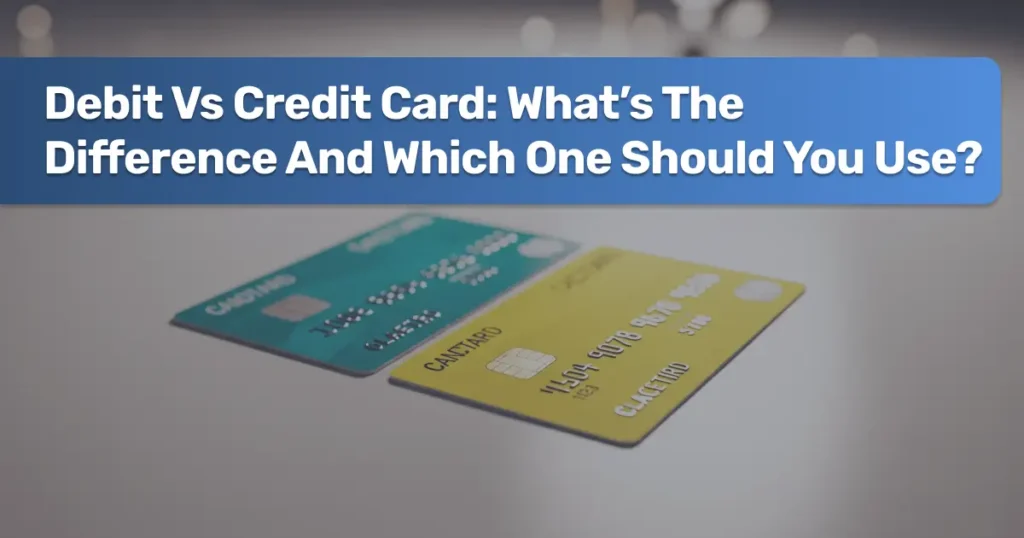In today’s world of advanced payments with phone and watches, online shopping, and mobile wallets, having a card in your wallet or on your device isn’t just a convenience. It’s a necessity! But when you’re at the bank or signing up for a new financial app, you’re often faced with a common question:
Should you get a debit card or a credit card?
They might look the same, but they serve different purposes, come with different risks, and can affect your finances in very different ways.
What is a Debit Card?
A debit card is connected directly to your bank account. When you use it to make a payment, the money comes out from your balance.
Key Features:
- Spends only what you already possess
- No interest or monthly bills
- Great for the controlled budgeting and everyday usage
- Lower risk of debt
Best for: Everyday purchases, managing spending, avoiding debt.
What is a Credit Card?
A credit card lets you borrow money from the card issuer up to a certain limit. You can repay it later, usually at the end of the month, or over time (with interest).
Key Features:
- Borrow now, pay later
- Can build your credit score
- Often comes with rewards, cashback, or travel perks
- If not managed well, can lead to high-interest debt
Best for: Travel, building credit, earning rewards, larger purchases with repayment flexibility.
Key Differences at a Glance
| Feature | Debit Card | Credit Card |
|---|---|---|
| Source of funds | Your bank balance | Borrowed from card issuer |
| Spending limit | What’s in your account | Your credit limit |
| Interest | None | Only if balance isn’t paid off |
| Credit score impact | No | Yes (positive or negative) |
| Rewards | Rare | Often available |
| Risk of overspending | Low | Higher if not managed |
How to Choose the Right Card for You
Still unsure which one to pick? Here’s how to decide:
✔️ Choose a debit card if:
- You want to control spending and stick to your budget
- You’re new to banking or just opening your first account
- You don’t want to worry about monthly repayments
- You prefer simplicity
✔️ Choose a credit card if:
- You have stable income and can pay off potential credits monthly
- You want to build or improve your credit score
- You travel often or shop online and want extra protection
- You want to earn cashback, points, or miles
Tip: Use Both. The Smart Way
You don’t have to choose only one. Many people use both for different purposes:
- Use a debit card for daily spending (groceries, coffee, subscriptions)
- Use a credit card for large purchases, online orders, and travel (to take advantage of protection and rewards)
Just remember: Always pay off your credit card in full to avoid interest! When interest jumps in credit card is no longer your good friend.
Final Thoughts
Both debit and credit cards offer good level of flexibility, convenience, and security. But they work differently, and choosing the right one depends on how you manage your money and what your goals are.
Looking to keep things simple? Debit might be best. Want to build a credit history and earn rewards? Then credit could be your friend – just be disciplined and careful.
FAQ: Debit vs Credit Card
A debit card draws money directly from your bank account. A credit card allows you to borrow money up to a set limit, repayable later
Debit cards typically carry low or no annual fees. Credit cards may include fees like annual charges, interest on borrowed amounts, and possible late payment fees
Debit card usage does not incur interest. Credit cards charge interest on unpaid balances, often at high annual rates that accumulate if not paid in full
Credit cards generally offer stronger fraud protection, with easier dispute processes and limited liability. Debit cards may involve more complex recovery procedures
Only credit cards help build your credit history if used responsibly and payments are made on time. Debit cards have no impact on credit scores
Debit cards are ideal for everyday transactions when you want to stick to your bank balance and avoid debt
Use a credit card for online purchases, travel bookings, or situations where better fraud protection and travel perks are beneficial

